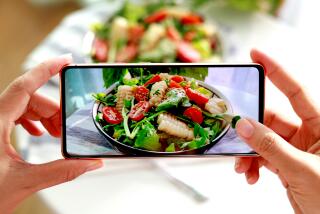Recipe for Controversy : The Meat of Author’s Nutritional Philosophy Is Poison to His Critics
- Share via
Paul Saltman, Ph.D., respected biochemist, revered professor, author of a new book billed as the latest word from California on nutrition, was moving quickly about the kitchen of his La Jolla home preparing lunch one recent afternoon.
Out came a bag of ruffled potato chips. Then came slices of Italian sausage on rye toast, topped with glistening pools of melted cheese. There was beer, miniature yellow tomatoes and sweet nectarines. Topping it off, a frozen Snickers.
“When I say be a hedonist, I mean it. But you’ve got to be a constructive hedonist,” Saltman muses to a visitor. “ . . . I say I’m giving people more fun--to be able to eat a nice toasted salami and cheese sandwich and not feel like you’re doing primal sin.”
Saltman is a defender of the Twinkie. He has a box of Butterfingers in a freezer in his garage. He is also partial to red meat, poached eggs, fish and chicken, fruits and vegetables, corned beef hash and “a wonderful chocolate mousse.”
Saltman likes to make the point that no food is inherently evil. All foods have nutritional “redeeming virtue.” But, he contends, zealots have sought to banish certain foods, leaving our lives gastronomically poorer and our bodies nutritionally deprived.
“You remember when you were a kid and the lady held up the four basic food groups?” Saltman said one recent afternoon while constructing a salami and cheese on rye. “Well, what the hell is a pizza? It’s all of the above!”
Saltman’s ideas make dietitians, and even ordinary eaters, edgy.
Some people are suspicious of Saltman’s heresies--red meat is good for you, salt won’t kill you, sugar is low-cal. Indoctrinated in dietary dogma, they seem uncomfortable with his laissez-faire approach: Know what you are eating, then eat what you want.
Others oversimplify his theories. “Snickers and Twinkies will make you Healthy,” shrieks a supermarket tabloid. A few wonder whether the Beef Council has an unhealthy interest in Saltman. (His recent address to the council: “Stop Being Chicken About Beef.”)
Consumer advocates say Saltman’s emphasis is dangerously misplaced. In the midst of an epidemic of heart disease, they say it is perverse to praise red meat. Where Saltman sees a great source of minerals and trace elements, they see fats, cholesterol and atherosclerosis.
“If he were a historian, he would describe how beautifully Attila the Hun combed his hair,” sneered Michael Jacobson, who heads the Center for Science in the Public Interest in Washington. “Or he might say that Adolph Hitler brushed his teeth twice a day, while perhaps decrying that Clara Barton didn’t iron her dress.”
Saltman’s arguments, laid out inhis new book, “The California Nutrition Book,” published this month, go something like this:
Food and eating are a source of pleasure. But food bigots are taking away the fun, Saltman claims. They have promulgated rules rooted in religion or abstraction, not nutritional science. Good foods are being driven from our diets, he says.
Saltman says American women, in particular, are depriving themselves of nutrients because they have sworn off such things as red meat and milk. He says many are living “sub-optimally” and below their genetic potential, risking diseases like osteoporosis.
No food is all bad or all good, Saltman argues. Fruits and vegetables have vitamins and minerals but lack other nutrients. Salt may harm people with hypertension, but there is no proof that it is hurting the rest of us, Saltman claims.
The lesson: eat a balanced diet, Saltman says. People should analyze their eating habits, using dietary tables, and learn what nutrients are missing. Nutrition is complex, but learning the principles will liberate people to live up to their potential, he says.
A few of Saltman’s more controversial contentions:
- Sugar isn’t poisonous, but lack of sugar is.
- Cutting dietary cholesterol may not reduce cholesterol levels in a person’s blood.
- Alcohol, on balance, is a nutritional asset, in moderation.
- Obesity is the biggest threat to health.
- There is no universal benefit in everyone cutting down on salt.
- Coca-Cola? A source of water.
A young undergraduate was sitting in Saltman’s office in UC San Diego’s Bonner Hall one morning earlier this month, looking baffled.
“Twinkies don’t have nutrients,” she scoffed at him, as though dismissing a joke.
“The hell they don’t!” shot back Saltman. He holds court regularly in a room lined with books and Rouault prints, bantering with people who pause in his doorway and engaging visiting students in a gently hectoring dialogue.
“They have more nutrients than an apple or an orange,” he went on. “ . . . They have more protein than an apple or an orange . . . more B vitamins . . . more calcium . . . more trace elements than an orange has.”
“I don’t see how there could be more vitamins and nutrients,” she said, scowling.
“Because you add it! What the hell do you think is in an apple?”
“Don’t they have more fat?” the woman asked, getting back to Twinkies.
“Sure they do! What’s wrong with that? You need so many calories a day. Does it matter whether you get the calories in sugar or fat or protein?”
“But it’s not natural . . . “
“What difference does it make? What difference does it make if I synthesize a glucose molecule in my laboratory and feed it to you or I let an orange make it for you? . . . You’re talking aesthetics! You’re not talking science.”
Saltman draws distinctions between the “physics” and the “metaphysics” of eating. “Nutrition is science, food is metaphysics,” he says. A balanced life can include both but people should know which is which.
Saltman says the scientific principles of nutrition are: People get some 40 essential nutrients through eating. They must have them in the right combinations and amounts if they are to remain healthy and meet their genetic potential, Saltman says.
The metaphysics, by contrast, consist of the symbolic, religious and iconographic significance of food. If foods like meat generate bad karma, that is a matter of metaphysics, says Saltman, not a question of science.
The ‘Myths’ of Eating
“The point I’m making is there’s a whole thing about food. Birthday cakes mean something, OK? It means something to me about why the Jews won’t eat pork.
” . . . It’s a way that you keep societies isolated--with food. What’s taking communion? Eating the flesh and the blood of Christ? Is that food? You bet your ass! What is that pumpkin? Is this food or is it icon? . . . It’s art as well.”
Then there are the emotional associations people have with food--associations, which Saltman says make it difficult to change eating habits. People associate their dietary habits with parents, values, ethics, good taste, and, of course, their religious beliefs.
“You see, the whole notion of forbidden fruit is wonderful,” he says. “You remember the Biblical story of the Garden of Eden? What’s the apple? The apple is knowledge! Its food is knowledge, and it’s forbidden, and it’s tasted of. I love it.”
Based on that logic, Saltman claims his message is one of enlightenment: “I think it’s liberation theology!”
To Michael Jacobson, it’s “way off in left field.”
Jacobson, who has a Ph.D. in microbiology, directs the Center for Science in the Public Interest, the consumer education and advocacy group that claims responsibility for bringing the dangers of sulfites to public attention.
‘Very Little Wisdom’
In an interview, Jacobson accused Saltman of a “misplaced emphasis”--a skewed vision that Jacobson said renders useless much of the information in Saltman’s book. He dismissed Saltman as having “a lot of knowledge and very little wisdom.”
Saltman’s book contains a lot of informative facts, including the nutritional values in the appendix and its chapters on smoking and exercise, Jacobson said. But Saltman fails to forge his voluminous facts into useful guidelines for the general public.
Another consumer-health advocate makes a similar point, challenging Saltman’s view that certain dietary truisms are not applicable for many people. (Saltman says many people, because of their makeup, need not cut cholesterol and salt consumption.)
“We’re talking populations and public health,” said Dr. Sidney Wolfe, director of Public Citizen Health Research Group in Washington. “ . . . No one is going to be harmed by that (advice) and enough people will benefit.”
Some Think Notions Bizarre
Jacobson also differs with Saltman’s conclusion that there is no persuasive evidence linking some foods to hyperactivity in children. And he said alcohol provides nothing but “empty calories” that “push out” other things from the diet.
He accused Saltman of over-emphasizing the importance of minerals and trace elements, “which in general aren’t a very severe problem in the American diet.” In contrast to fats causing heart disease, Jacobson said, “people aren’t dying of zinc deficiencies.”
“I think it’s bizarre to have a professor who teaches nutrition at a major university excuse foods that have very serious problems,” Jacobson said when he appeared on the “Phil Donahue” show earlier this month to debate Saltman.
“The basic problem of the American diet is that it is high in fat, especially saturated fat, which contributes to hundreds of thousands of heart attacks each year,” he said. “And he’s excusing foods like Twinkies, red meat and bacon. It’s just astonishing.”
The phone rings in Saltman’s office.
“I haven’t eaten in a Jack-in-the-Box in a long time, I’m ashamed to report to you,” Saltman informs the caller. “ . . . Finger food? Give me a ‘for instance.’ . . . Are they all deep fried? . . . Yeah, yeah, yeah. Whaddya want me to do?”
The caller talks for awhile on the other end. Saltman says yes, he’s worked with food groups before--a produce group, the Beef Council, the dairy people. He says he does it if he can talk about good nutrition in a reasonable context: “I won’t be a whore.”
“Well, OK, you gotta know that I don’t come cheap,” he tells the caller bluntly. “It’d cost you a minimum of two grand a day, including travel. . . . Well, you gotta read my book, baby. It’s all in there. It’s all in there.”
Gives Ranchers a Pep Talk
Last month, the Beef Council flew Saltman to Sun Valley, Idaho, where he delivered his talk, “Stop Being Chicken About Beef.” His audience, he says, consisted of food editors brandishing Gucci bags, and a bunch of cowboys and ranchers.
Saltman ended up giving the beef men a pep talk: “ . . . I told the cowboys they ought to . . . stop apologizing for what they have, and start breeding cattle that have lower fat, and to start looking for other ways of preparing beef products,” he recalls.
Saltman estimates that he makes about $15,000 a year in speaking engagements for a wide range of groups. He says he has invested most of the money over the past five years in his lab, where he researches such things as hemoglobin, myoglobin and osteoporosis.
“I feel comfortable as long as I feel honest and I don’t have to say things I wouldn’t say otherwise,” he replied when asked if he was stung by Phil Donahue’s suggestion Saltman might have a Beef Council bias. “Everything I say has to be existentially true. I will not lie about a piece of meat.”
Saltman was born and reared in Los Angeles, the son of a furniture manufacturer. Both his parents died when he was a child--his mother of pneumonia when he was 5, his father in an automobile accident when he was 14.
He attended public schools, then went to Caltech--on a basketball scholarship, he likes to joke, being 6-foot-5 tall. He spent 14 years on the faculty of the University of Southern California, then became a professor of biology at UCSD in 1967.
He went on to become vice chancellor for academic affairs at UCSD in 1972 and held that position until 1980. But when he was not made chancellor, Saltman returned to teaching; he didn’t want to be “second banana.”
His earthy teaching style is famous. On a coffee table in his office lies a 1984 “most valuable professor” award from the students of UCSD’s Muir College. It is a shellacked Twinkie balanced on a pedestal.
Saltman, 59, plays tennis regularly. He is a lifelong surfer, with a key to the gate to Black’s Beach a few hundred yards from his house. Two 9 1/2-foot surfboards stand in the corner of his garage, beside a forest-green Mercedes-Benz.
Saltman became interested in nutrition more than 20 years ago when he was an assistant professor at USC.
More to Read
Eat your way across L.A.
Get our weekly Tasting Notes newsletter for reviews, news and more.
You may occasionally receive promotional content from the Los Angeles Times.










